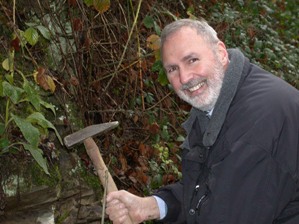 World authority on conodont palaeobiology, Silurian stratigraphy and fossil lagerstätten.
World authority on conodont palaeobiology, Silurian stratigraphy and fossil lagerstätten.
‘Dick’ Aldridge died 4 February 2014, aged 68. He undertook his BSc at the University of Southampton where he completed a PhD on the early Silurian conodonts of the UK under the supervision of Ronald Austin. He moved to lecturing positions at UCL and then Nottingham University, finally moving in 1989 to the University of Leicester where he remained until retirement (2011). Dick’s research was initially focused on exploiting conodonts to unravel the Silurian stratigraphy of the UK and beyond, before a lucky break served to define his career.
Conodonts are known almost wholly from their tooth-like ‘elements’ of an otherwise enigmatic organism, guessing whose biological affinity was the ultimate palaeontological parlour-game. As the UK’s foremost conodontologist, Dick was called upon to pronounce on the discovery of conodont soft tissue remains by Euan Clarkson and Derek Briggs in the Lower Carboniferous limestones of Edinburgh’s Granton foreshore. So began a renaissance in conodont palaeobiology that soon, led by Dick, recruited generations of researchers. Together they transformed understanding of the anatomy of conodonts and their significance in early vertebrate evolution.
In parallel with this work, Dick continued his taxonomic studies; employed conodonts to unravel the geothermal history of the Caledonides; elucidated (with David Siveter) the micropalaeontology of Silurian stratotypes and, with Lennart Jeppsson, established a provocative model of alternating ocean-climate state in the Silurian world. However, conodont palaeobiology led him to the Ordovician Soom Shale which, with colleagues, shifted the focus of the last decade of his career onto elucidating the faunas and fossilization mechanisms of Konservat-Lagerstätten.
Dick took his role in supporting the careers of others seriously, serving two terms as Head of Department, as a Senator, and Chair of Physical Sciences, all at Leicester University. He also served on the Review Panel of the Natural Environment Research Council, as a Specialist Adviser for RAE2001 and RAE2008. He served on Royal Society research grant committees, co-chaired the Third International Palaeontological Congress (London, 2010), and co-wrote the bid to make the Chengjiang Largerstätte a UNESCO World Heritage Site. Early in his career, Dick’s professional duties included being Chair of the Conodont Group of the British Micropalaeontological Society (as was), President of the Geology Section of the British Association, serving on the Councils of The Geological Society and The Palaeontographical Society and, for the Palaeontological Association, as Marketing Manager.
Dick also served as the Chairman/President of most of the major professional societies in palaeontology, including the British Micropalaeontological Society (1995-1998), the Pander Society (1998-2004), the International Palaeontological Association (2002–2006), and the Palaeontological Association (2008-2010). Characteristically, he did not accept any of these as honorifics and worked tirelessly to lobby for individuals and institutions under threat or seeking new opportunities.
Dick’s achievements were recognised with the Pander Medal (Pander Society), the Lapworth Medal (Palaeontological Association), the Coke Medal (Geological Society) and the Brady Medal (Micropalaeontological Society), as well as Honorary Visiting Professor positions in the China University of Geosciences (Wuhan) and Yunnan University.
Dick seemed happiest in a tutorial, lecture hall, lab or fieldtrip, sharing his knowledge but challenging his students to think for themselves. Dick became a father figure to those of us lucky enough to become his responsibility. None will forget long journeys shared with Dick, that passed invariably with games of ‘conodont genera A-Z’ and music trivia, interspersed with gentle teasing.
He leaves behind a large academic family in addition to his wife Alison, their children James, David and Rebecca, their partners and his seven grandchildren, to all of whom he was devoted. His loss is felt keenly by all.
By Philip Donoghue